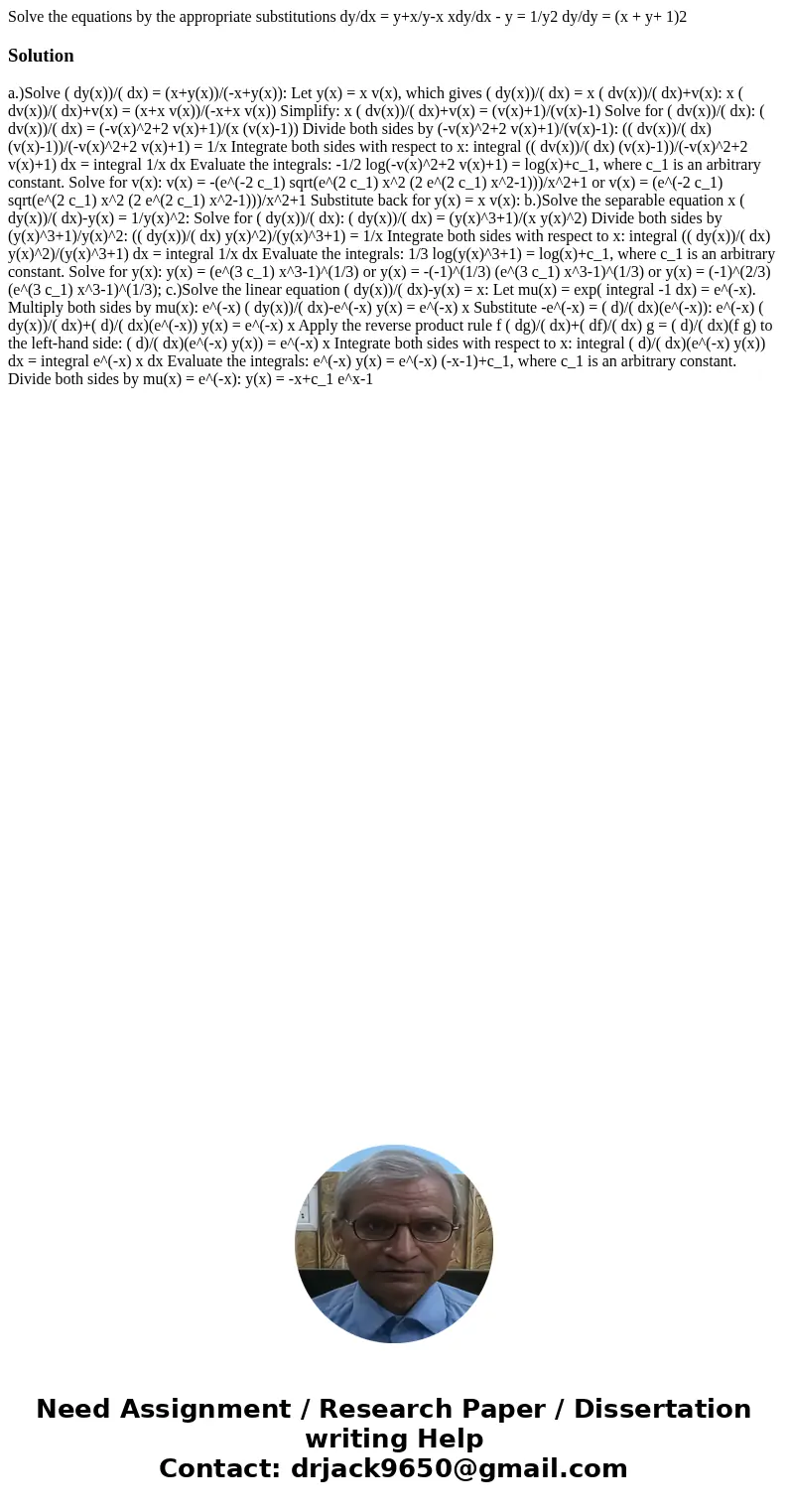Solve the equations by the appropriate substitutions dydx y
Solve the equations by the appropriate substitutions dy/dx = y+x/y-x xdy/dx - y = 1/y2 dy/dy = (x + y+ 1)2 
Solution
a.)Solve ( dy(x))/( dx) = (x+y(x))/(-x+y(x)): Let y(x) = x v(x), which gives ( dy(x))/( dx) = x ( dv(x))/( dx)+v(x): x ( dv(x))/( dx)+v(x) = (x+x v(x))/(-x+x v(x)) Simplify: x ( dv(x))/( dx)+v(x) = (v(x)+1)/(v(x)-1) Solve for ( dv(x))/( dx): ( dv(x))/( dx) = (-v(x)^2+2 v(x)+1)/(x (v(x)-1)) Divide both sides by (-v(x)^2+2 v(x)+1)/(v(x)-1): (( dv(x))/( dx) (v(x)-1))/(-v(x)^2+2 v(x)+1) = 1/x Integrate both sides with respect to x: integral (( dv(x))/( dx) (v(x)-1))/(-v(x)^2+2 v(x)+1) dx = integral 1/x dx Evaluate the integrals: -1/2 log(-v(x)^2+2 v(x)+1) = log(x)+c_1, where c_1 is an arbitrary constant. Solve for v(x): v(x) = -(e^(-2 c_1) sqrt(e^(2 c_1) x^2 (2 e^(2 c_1) x^2-1)))/x^2+1 or v(x) = (e^(-2 c_1) sqrt(e^(2 c_1) x^2 (2 e^(2 c_1) x^2-1)))/x^2+1 Substitute back for y(x) = x v(x): b.)Solve the separable equation x ( dy(x))/( dx)-y(x) = 1/y(x)^2: Solve for ( dy(x))/( dx): ( dy(x))/( dx) = (y(x)^3+1)/(x y(x)^2) Divide both sides by (y(x)^3+1)/y(x)^2: (( dy(x))/( dx) y(x)^2)/(y(x)^3+1) = 1/x Integrate both sides with respect to x: integral (( dy(x))/( dx) y(x)^2)/(y(x)^3+1) dx = integral 1/x dx Evaluate the integrals: 1/3 log(y(x)^3+1) = log(x)+c_1, where c_1 is an arbitrary constant. Solve for y(x): y(x) = (e^(3 c_1) x^3-1)^(1/3) or y(x) = -(-1)^(1/3) (e^(3 c_1) x^3-1)^(1/3) or y(x) = (-1)^(2/3) (e^(3 c_1) x^3-1)^(1/3); c.)Solve the linear equation ( dy(x))/( dx)-y(x) = x: Let mu(x) = exp( integral -1 dx) = e^(-x). Multiply both sides by mu(x): e^(-x) ( dy(x))/( dx)-e^(-x) y(x) = e^(-x) x Substitute -e^(-x) = ( d)/( dx)(e^(-x)): e^(-x) ( dy(x))/( dx)+( d)/( dx)(e^(-x)) y(x) = e^(-x) x Apply the reverse product rule f ( dg)/( dx)+( df)/( dx) g = ( d)/( dx)(f g) to the left-hand side: ( d)/( dx)(e^(-x) y(x)) = e^(-x) x Integrate both sides with respect to x: integral ( d)/( dx)(e^(-x) y(x)) dx = integral e^(-x) x dx Evaluate the integrals: e^(-x) y(x) = e^(-x) (-x-1)+c_1, where c_1 is an arbitrary constant. Divide both sides by mu(x) = e^(-x): y(x) = -x+c_1 e^x-1
 Homework Sourse
Homework Sourse